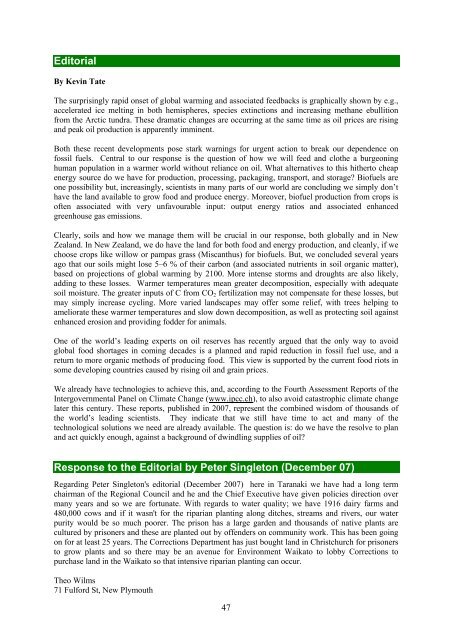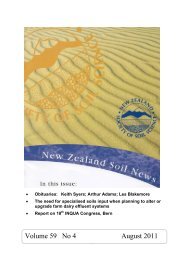Download - New Zealand Society of Soil Science
Download - New Zealand Society of Soil Science
Download - New Zealand Society of Soil Science
You also want an ePaper? Increase the reach of your titles
YUMPU automatically turns print PDFs into web optimized ePapers that Google loves.
Editorial<br />
By Kevin Tate<br />
The surprisingly rapid onset <strong>of</strong> global warming and associated feedbacks is graphically shown by e.g.,<br />
accelerated ice melting in both hemispheres, species extinctions and increasing methane ebullition<br />
from the Arctic tundra. These dramatic changes are occurring at the same time as oil prices are rising<br />
and peak oil production is apparently imminent.<br />
Both these recent developments pose stark warnings for urgent action to break our dependence on<br />
fossil fuels. Central to our response is the question <strong>of</strong> how we will feed and clothe a burgeoning<br />
human population in a warmer world without reliance on oil. What alternatives to this hitherto cheap<br />
energy source do we have for production, processing, packaging, transport, and storage? Bi<strong>of</strong>uels are<br />
one possibility but, increasingly, scientists in many parts <strong>of</strong> our world are concluding we simply don’t<br />
have the land available to grow food and produce energy. Moreover, bi<strong>of</strong>uel production from crops is<br />
<strong>of</strong>ten associated with very unfavourable input: output energy ratios and associated enhanced<br />
greenhouse gas emissions.<br />
Clearly, soils and how we manage them will be crucial in our response, both globally and in <strong>New</strong><br />
<strong>Zealand</strong>. In <strong>New</strong> <strong>Zealand</strong>, we do have the land for both food and energy production, and cleanly, if we<br />
choose crops like willow or pampas grass (Miscanthus) for bi<strong>of</strong>uels. But, we concluded several years<br />
ago that our soils might lose 5–6 % <strong>of</strong> their carbon (and associated nutrients in soil organic matter),<br />
based on projections <strong>of</strong> global warming by 2100. More intense storms and droughts are also likely,<br />
adding to these losses. Warmer temperatures mean greater decomposition, especially with adequate<br />
soil moisture. The greater inputs <strong>of</strong> C from CO 2 fertilization may not compensate for these losses, but<br />
may simply increase cycling. More varied landscapes may <strong>of</strong>fer some relief, with trees helping to<br />
ameliorate these warmer temperatures and slow down decomposition, as well as protecting soil against<br />
enhanced erosion and providing fodder for animals.<br />
One <strong>of</strong> the world’s leading experts on oil reserves has recently argued that the only way to avoid<br />
global food shortages in coming decades is a planned and rapid reduction in fossil fuel use, and a<br />
return to more organic methods <strong>of</strong> producing food. This view is supported by the current food riots in<br />
some developing countries caused by rising oil and grain prices.<br />
We already have technologies to achieve this, and, according to the Fourth Assessment Reports <strong>of</strong> the<br />
Intergovernmental Panel on Climate Change (www.ipcc.ch), to also avoid catastrophic climate change<br />
later this century. These reports, published in 2007, represent the combined wisdom <strong>of</strong> thousands <strong>of</strong><br />
the world’s leading scientists. They indicate that we still have time to act and many <strong>of</strong> the<br />
technological solutions we need are already available. The question is: do we have the resolve to plan<br />
and act quickly enough, against a background <strong>of</strong> dwindling supplies <strong>of</strong> oil?<br />
Response to the Editorial by Peter Singleton (December 07)<br />
Regarding Peter Singleton's editorial (December 2007) here in Taranaki we have had a long term<br />
chairman <strong>of</strong> the Regional Council and he and the Chief Executive have given policies direction over<br />
many years and so we are fortunate. With regards to water quality; we have 1916 dairy farms and<br />
480,000 cows and if it wasn't for the riparian planting along ditches, streams and rivers, our water<br />
purity would be so much poorer. The prison has a large garden and thousands <strong>of</strong> native plants are<br />
cultured by prisoners and these are planted out by <strong>of</strong>fenders on community work. This has been going<br />
on for at least 25 years. The Corrections Department has just bought land in Christchurch for prisoners<br />
to grow plants and so there may be an avenue for Environment Waikato to lobby Corrections to<br />
purchase land in the Waikato so that intensive riparian planting can occur.<br />
Theo Wilms<br />
71 Fulford St, <strong>New</strong> Plymouth<br />
47










